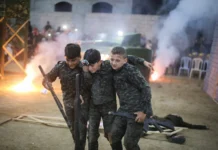Violence in Iraq has fallen to its lowest level since the overthrow of Saddam Hussein in 2003, as Isis loses its base areas and its bombing attacks are thwarted by informers and double agents. A senior Iraqi security official says that intelligence about potential Isis attacks has improved to the point that government forces can monitor a bomb from construction to detonation, allowing it to explode after evacuating civilians so Isis does not know that its bomb-making networks have been penetrated.
“We have people who work with Isis who agree to work with us,” said Interior Minister Qasim al-Araji in an interview with The Independent in Baghdad. “Isis does not know this and we make sure our informant is not exposed.” Sometimes security forces even pay for the car that transports a bomb to Baghdad and allow it blow up in a place which Isis has targeted. “We ask people to move and make an official statement with a false number of casualties,” he says.
Mr Araji, a long-time leader of the militant Shia Badr Organisation, got his job as Interior Minister last year when his predecessor resigned in the wake of an Isis car bomb that killed over 300 people in the Karada district in central Baghdad. He says that this could happen again, but is much less likely now because Isis no longer holds cities and districts where it can safely organise and equip bombers. “The main thing is that the caliphate has been broken,” he says. “There is only one town – Rawa – and the western desert where Isis still holds out.”
Isis shows signs of demoralisation and defeatism as it loses its last pockets of territory, though it leaders are likely to have recognised that it was going to be defeated in Mosul because of the military superiority of its enemies. It will therefore have prepared “sleeper cells” along with desert hideouts and arms, ammunition and food dumps to enable its remaining forces to survive and launch occasional attacks to show they are still in business. Al-Qaeda in Iraq, the predecessor of Isis, was able to recover from defeats by successfully lying low between 2007 and 2012, when it re-emerged as circumstances changed in its favour.
Isis will try to do the same again, but cannot succeed if its networks of militants are exposed and eliminated. Mr Araji, speaking in his office in the Green Zone in Baghdad, says, “We have cooperation from members of important Isis families to help our security units.” He said that the wife of an Isis leader was to make contact later in the day: “We give her money and keep her identity secret, but she does it because she wants to protect her sons and stay alive herself.”
Mr Araji says that there had been no successful Isis attacks during the Arbaeen commemoration when millions of Shia walk to their holy city of Kerbala from all over Iraq. The vast numbers are difficult to defend and they have traditionally been easy targets for Isis suicide bombers who mingle with the crowds. As evidence of greater security, he reads from a dossier prepared for the Prime Minister, Haider al-Abadi, showing that there had been just two attempted suicide bombings during Arbaeen and both the bombers had been killed without hurting anybody else.
In the past, Iraqi officials have privately blamed corruption for the ability of suicide bombers or trucks filled with gunmen to make their way unhindered through government checkpoints. In Mosul, local people say they are frightened when they see Isis fighters, whom they had informed against and had been arrested, back on the streets after – they assume – bribing their way to freedom. Mr Araji agreed that such things did happen and said an officer in the interior was “about to be charged for helping Isis families escape from Mosul to Baghdad”.

























